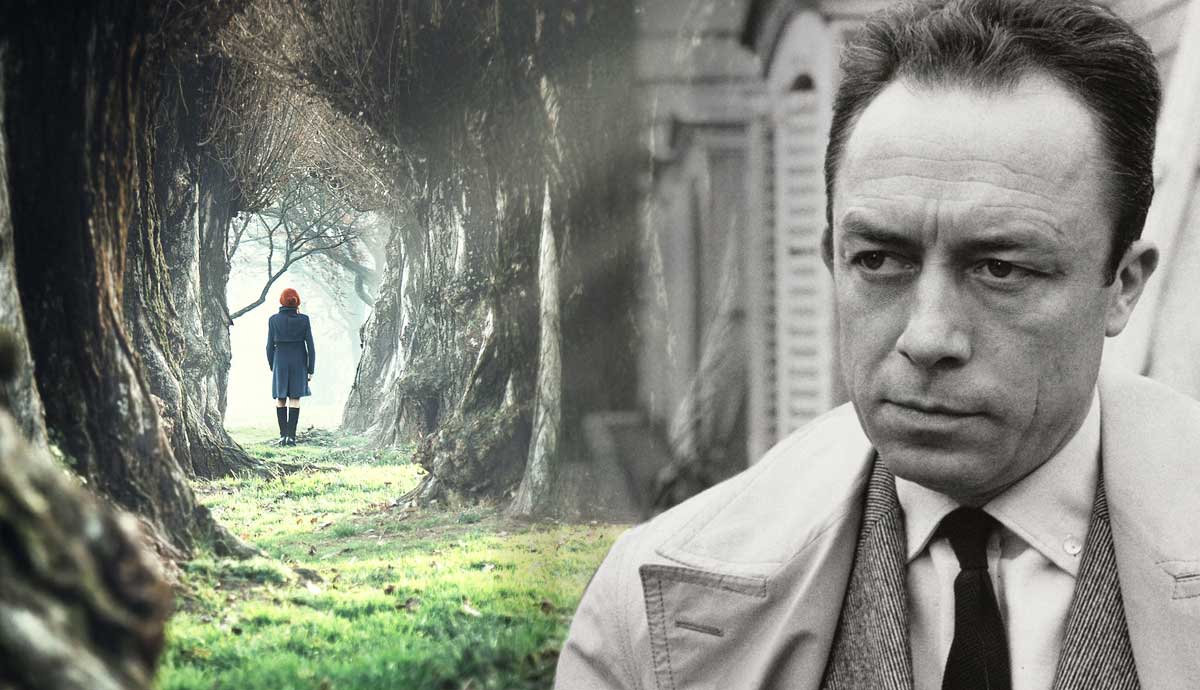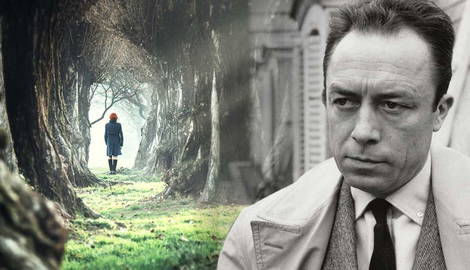
summary
- Albert Camus, a French writer and philosopher, explored the absurdity of human existence and the meaning(lessness) of life.
- His philosophy, often associated with existentialism, stemmed from a lifelong confrontation with mortality.
- Camus believed life has no inherent meaning, an “absurdist view” that challenges traditional sources of purpose.
- He proposed that confronting this absurdity through rebellion, embracing freedom, and passion is how to live.
Camus was seriously ill with tuberculosis in childhood, and the constant threat of death influenced Camus’ life and pushed him toward philosophy. He was an adherent of existentialism, and his work was characterized by a pronounced social pessimism and was devoted to the topic of suicide, murder, unrest, and terror. Camus repeatedly stated that he did not consider himself a philosopher. Nevertheless, his works entered philosophy as a pessimistic doctrine of the absurdity of human existence. In his work, human existence is understood as finite, limited by the framework of earthly existence. His greatest concern was the meaning of life, or rather, is life worth living?
Who Was Albert Camus?

Albert Camus was a French writer, philosopher, and journalist. Albert Camus’ books include The Stranger, The Myth of Sisyphus, and The Rebel. Camus was awarded the Nobel Prize in Literature in 1957.
Born in Algeria in 1913, Camus was the son of a French father and an Algerian mother. He was raised in a poor, working-class neighborhood in Algiers. Camus attended local schools and later the University of Algiers.

The Stranger, Albert Camus’s first book, was published in 1935. A work of fiction, it tells the story of an Algerian man named Meursault who kills an Arab man for no apparent reason. The novel caused a sensation, making Camus an overnight celebrity.
In the 1940s, Camus became involved in the French Resistance movement against the Nazi occupation of France. He also wrote several plays and essays denouncing the absurdity of war.
After the war, Camus returned to Algeria and continued to write about the human condition. In 1957, he was awarded the Nobel Prize in Literature. Camus died in a car accident in 1960. However, his work continues to be read and discussed by students and scholars worldwide.
Camus’ Existentialism

Camus’ philosophical views are sometimes contradictory and have undergone a serious evolution. They are characterized by individualism and the comprehensive development of the problem of the meaninglessness of existence.
His ideas are presented both in the form of philosophical treatises and in the form of works of art: stories, novels, and plays. The style is sometimes figurative and metaphorical. His narrative plots revolve around the individual and his relationship with the surrounding world, whether it is social or natural.
In philosophical terms, Camus is associated with existentialism. The general starting point of existentialist philosophy is that man’s existence is the only reality that should and can be explored.

Camus’s existentialism is based on despair, which is caused not by the abomination of life and man (as in Jean Paul Sartre) but by the thought of the individual’s greatness and his inability to find a connection with an indifferent (but beautiful!) world. Throughout the works of Camus, the same motives of loneliness, “abandonment,” absurdity, death, and despair are a consistent leitmotif.
The central theme of Camus’ philosophy was the question of the meaning of human existence, whether “life is worth living.” The philosopher seeks to study the modern individual, examine their lives in the smallest detail, and understand what drives people in the painful search for the meaning of their own existence.
Camus concludes that the existence of man is absurd in itself and takes this concept as a basis for his philosophy.
“I opened myself to the gentle indifference of the world,” are among the closing words of The Stranger.
Camus On Suicide

In his essay The Myth of Sisyphus, Albert Camus claims that there is only one really serious philosophical problem, and that is suicide. Camus believes that the only way to understand the meaning of life truly is to confront the possibility of death. For Camus, the question of whether or not life is worth living is central to our understanding of how we ought to live our lives.
Camus is not advocating for suicide, but he is trying to get us to see that the issue of death is something we must come to terms with if we want to understand what it means to be truly alive. He believes that facing up to the inevitability of our own death can help us appreciate life’s value. In other words, we can learn to appreciate life all the more by understanding that death is inevitable.

Camus understands that a life without meaning is not worth living and tackles the problem head-on. First, he concludes that suicide is of little use to us, as there can be no more meaning in death than in life. Next, Camus questions what makes life worth living, but doesn’t offer much practical help when it comes to finding meaning in our lives.
Camus’ thoughts on suicide are controversial, but they offer an interesting perspective on how we should view our own mortality. His belief that we must come to terms with death to appreciate life can help us see the value in every moment.
What Is the Meaning of Life?

What is the meaning of life? Why are we here? What is the point of all this? These are questions that have been asked since the dawn of time, yet nobody has been able to provide a satisfactory answer. Camus believes that the reason for this is that there is no meaning to life. Of course, it is an absurdist view. Still, Camus argues that it is the only logical conclusion one can reach when considering the evidence.
He starts by looking at the question from a scientific standpoint. If we take the universe at face value, it is an indifferent and purposeless place. The stars don’t care about us; we are just a tiny speck in the grand scheme of things. It is the first clue that leads Camus towards the conclusion that life has no meaning.
He then turns to religion, which has traditionally been seen as the source of meaning in life. However, Camus points out that even religious beliefs are ultimately based on faith, not evidence. And even if there were a God, it is doubtful that he would be concerned with our lives or that he would have any grand plan for us.

Next, Camus considers the idea of creating our own meaning in life. It is the approach that many people take, but Camus argues that it is ultimately futile. Whatever meaning we give to our lives will be based on our own subjective preferences and opinions. And since there is no objective basis for these preferences, they are ultimately arbitrary.
Worse still, Camus believes that trying to impose meaning on the universe is a recipe for disaster. Any significance we try to create will eventually be contradicted by the evidence and will crumble under the weight of its own absurdity.
In the end, Camus concludes that the only sensible response to the question of the meaning of life is to say that there is none. Life is ultimately an absurd and purposeless affair. It may not be a comforting thought, but Camus believes it is the only honest conclusion we can reach.
Camus on the Absurd

What is the absurd? To some, it may seem like a mere philosophical concept. But to others, the absurd is an inescapable way of life. For Albert Camus, the absurd was defined as “the confrontation of man with the irrational.” In other words, it’s the clash between our need for meaning and purpose in life and the universe’s complete indifference to our existence.
On one hand, we have an innate desire to find meaning in everything we do. We want our lives to matter, to be part of something greater than ourselves. Yet, on the other hand, the universe is an impersonal place where anything and everything is possible. The two forces are diametrically opposed to one another, and this tension gives rise to the absurd.
The absurd is not just a philosophical concept; it’s a lived experience. It’s the experience of feeling lost and alone in a world that does not make sense. It’s the experience of being trapped in a cycle of futility, where our efforts always seem to fall short. It’s the experience of looking for answers but never finding them.
The absurd is not something to be feared or avoided; it is something to be embraced. To Camus, the absurd is not a negative force but a positive one. It is a reminder that we are alive and that our lives have value, even if they are ultimately meaningless.
How to Live in an Absurd World and Not Go Crazy?

In his work The Myth of Sisyphus, Albert Camus discussed the most important question from his point of view: “Is life worth living?”. After all, given all the circumstances, life turns out to be absurd and meaningless. We realize this at rare moments when our ideas about the world suddenly stop working and when routine actions and efforts begin to seem meaningless.
We routinely make reasonable plans for our lives that fail – we find ourselves face-to-face with an unpredictable world that does not correspond to our ideas.
This is the absurdity of our existence: it is ridiculous to be reasonable in an unreasonable world. This leads to the next big problem. Camus says that if the main components of the problem are the mind and the unreasonable world, then we can “cheat” and get around it by eliminating one of two things:
1. The first way is to ignore the meaninglessness of existence. Contrary to obvious evidence, one can pretend that the world is stable and live following distant goals (retirement, afterlife, human progress). But, according to Camus, in this case, we cannot act freely because our actions are tied to these arbitrary goals.
2. The second way to avoid absurdity is to abandon reasonable reasoning. Some philosophers do this by declaring the mind a useless tool (for example, Karl Jaspers). Others say that the world obeys a divine plan that people simply do not understand (Kierkegaard).
So, How Should We Live According to Albert Camus?

Camus considers both willful ignorance of the meaninglessness of existence and abandonment of reasonable reasoning unacceptable. But suicide is not an option for a philosopher either. From his point of view, this is a desperate gesture of final acceptance of the contradiction between the human mind and the unreasonable world. Instead of all this, Camus suggests three things:
1. Constant rebellion. The philosopher believes that we must constantly fight against the circumstances of our existence. Never admit defeat, even when faced with death, although we know it is inevitable. Camus says that metaphysical rebellion is the only way to be present in the world.
2. Denial of eternal freedom. Instead of becoming slaves to eternal ideas about the world, one must adhere to reason but be aware of its limitations and apply it flexibly in each specific situation. That is, we must seek freedom here and now and not in eternity.
3. Passion. It is the main driving force. We must love everything in life and strive to make it as fulfilling as possible.
Metaphysical rebellion is the movement by which man protests against his condition and against the whole of creation. It is metaphysical because it contests the ends of man and of creation. The slave protests against the condition in which he finds himself within his state of slavery; the metaphysical rebel protests against the condition in which he finds himself as a man. (The Rebel)
Let’s go back to Sisyphus. In the ancient Greek myth, he went against the gods and was punished for it. So, he was doomed to constantly push a stone uphill, which was falling down again and again.
Nevertheless, Camus calls him happy. The philosopher says that Sisyphus is the perfect model for us. He has no illusions about his position and its meaninglessness, but he rebels against circumstances. With each new stone fall, he consciously decides to try again. He pushes this stone again and again and realizes that this is the meaning of his existence.
Albert Camus Quotes
“Since we’re all going to die, it’s obvious that when and how don’t matter.”
“If something is going to happen to me, I want to be there.”
“The only way to deal with an unfree world is to become so absolutely free that your very existence is an act of rebellion.”
“You cannot create experience. You must undergo it.”
“Freedom is nothing but a chance to do better.”
“The myth of unlimited production brings war in its train as inevitably as clouds announce a storm.”
“You will never be happy if you continue to search for what happiness consists of. You will never live if you are looking for the meaning of life.”
“Man is the only creature who refuses to be what he is.”
“Freedom, “that terrible word inscribed on the chariot of the storm,” is the motivating principle of all revolutions. Without it, justice seems inconceivable to the rebel’s mind. There comes a time, however, when justice demands the suspension of freedom.”











